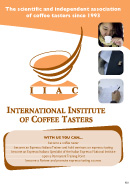Italian espresso abroad: training will save us Italians
by Carlo Odello *

Some people still believe that simply by virtue of being Italian we are entitled to talk about espresso with greater authority than others. It is a comforting thought cherished by many. And yet it could not be further from the truth, at least in some of the markets much coveted by us Italians.
Let’s take Japan, for example, a country that loves Italy and its products: the food, wine, fashion, history (because history is also a product that has to be sold through adequate marketing; who knows, perhaps sooner or later some of our politicians will wake up to this fact). Italian espresso therefore has an advantage over the other products. And yet let no one believe for a moment that being Italian is enough in itself to sell coffee in the Land of the Rising Sun. The Japanese are careful buyers: their selection of products is extremely accurate, long and complex. But once they choose a product, they stick to it faithfully, unless of course the supplier himself turns out to be unreliable.
Let’s take the USA, which have a very strong home market boasting thousands of coffee roasters. The specialty coffee and the so-called Third Wave dominate the market. And the West Coast, from Portland to Vancouver via the legendary Seattle, is a stronghold of espresso made in the USA (but luckily there are exceptions, such as Caffè Umbria which stubbornly and successfully continues to offer the tradition of Italian-style espresso). So let’s face it: the Americans are only relatively interested in Italian espresso.
What is the best way to enter both the Japanese and the American markets? Training, of course. The Japanese want to have certainties rather than half-truths. They want to have the tools to judge the quality for themselves. For this reason they appreciate the tasting courses designed to teach how to assess the quality of Italian espresso. As for the Americans, we just need to explain to them our espresso: the training periods are therefore vital to explain to them the importance of our seven grams per cup, of our 25-millimeter extraction, the centrality of the blend, and so forth.
A student of mine, who is a celebrity barista, told me recently in California: “The coffee tasting course has opened my eyes on what you Italians mean by espresso”. There are still many more eyes to be opened. And only through training can real culture and experience be passed on. The rest is important but nowhere near as effective.
P.S. Talking about training: from 18th to 20th May there are advanced courses in Brescia run by the International Institute of Coffee Tasters.
* Trainer and member of the board of the International Institute of Coffee Tasters

